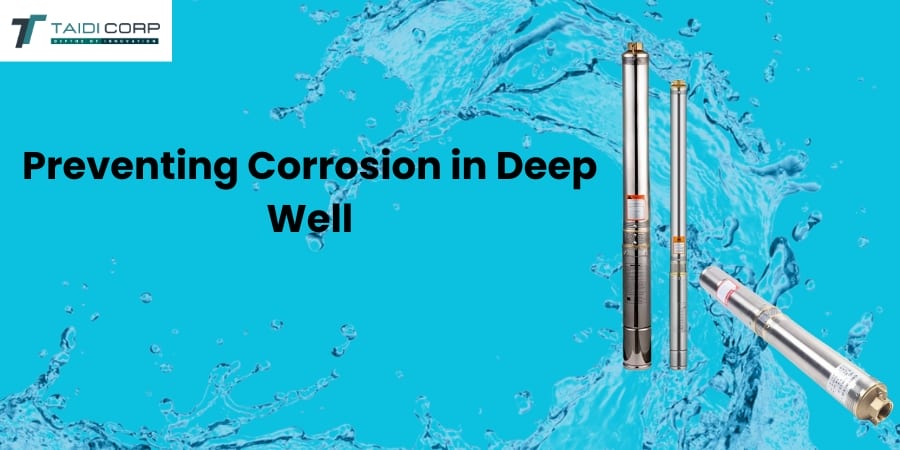
Corrosion in deep well submersible pumps can lead to significant problems, from reduced performance to total failure of the pump system. Whether you’re managing a farm, industrial facility, commercial operation, or a residential property, corrosion prevention is crucial to maintaining a reliable deep well water pump. This guide provides critical insights into how to prevent corrosion and extend the life of your pump, saving you time, money, and frustration.
Understanding the Risk of Corrosion in Deep Well Submersible Pumps
Deep well submersible pumps operate in harsh conditions, submerged in water for long periods, often in contact with corrosive minerals and chemicals. Corrosion can weaken the submersible pump motor, damage critical components like the submersible pump control box, and lead to frequent breakdowns. Without proper prevention, corrosion can dramatically shorten the lifespan of your deep well pump system.
Key Causes of Corrosion in Deep Well Submersible Pumps
To effectively prevent corrosion, it’s essential to understand the primary causes:
- Water Chemistry: High mineral content, such as calcium and magnesium, can increase the likelihood of corrosion in the deep well submersible pump.
- Electrical Issues: Faulty wiring or grounding in the submersible pump can lead to electrolysis, which accelerates metal corrosion.
- Improper Installation: Mistakes during deep well pump installation can expose the pump to unnecessary risks, such as exposure to corrosive elements in the surrounding soil or water.
For a detailed guide on avoiding these installation mistakes, refer to How to Install Deep Well Submersible Pumps: A Detailed Step-by-Step Guide.
Best Practices to Prevent Corrosion
1. Monitor Water Quality Regularly
Monitoring your deep well water is a critical step. Testing for pH levels, mineral content, and contaminants can help you identify potential risks before they cause damage. If your water has high mineral content or is acidic, installing a deep well water filter can significantly reduce the risk of corrosion.
2. Use Corrosion-Resistant Materials
Choosing pumps and components made from corrosion-resistant materials, such as stainless steel or coated metals, is an effective way to prevent corrosion. For example, when installing a submersible pump cable, ensure that it is designed to resist corrosion from prolonged exposure to moisture and minerals.
For more tips on installation and material selection, explore Expert Maintenance Tips for Maximizing the Performance of Deep Well Submersible Pumps.
3. Proper Grounding and Electrical Maintenance
Electrolysis, caused by electrical imbalances, can accelerate the corrosion process. Ensure that the submersible pump motor and all other electrical components are correctly grounded and maintained. Regular inspections of the submersible pump control box and wiring can prevent small issues from becoming expensive problems.
4. Regular Maintenance and Monitoring
Routine maintenance and monitoring are essential for preventing corrosion. Periodically check your deep well water system for signs of corrosion, such as rust or discoloration on metal parts. Early detection can save you from major repairs down the road. Regularly servicing your pump and scheduling professional inspections will keep the submersible pump for well in optimal condition.
For more guidance on maintenance, check out Effective Deep Well Pump Maintenance.
Installing and Protecting Submersible Pump Systems
When installing a deep well submersible pump, it’s critical to follow best practices to minimize the risk of corrosion. From selecting the right materials to properly setting the pump at the correct depth, a careful deep well water pump installation can save you from long-term corrosion issues.
Ensure that your deep well pump installation includes a detailed evaluation of the water chemistry and the use of protective measures like coatings or sacrificial anodes to prevent corrosion.
For more installation insights, refer to Comprehensive Troubleshooting Guide for Deep Well Submersible Pumps.
Advanced Monitoring and Diagnostics
Using advanced diagnostics can help monitor your deep well submersible system for early signs of corrosion. Modern sensors can detect changes in water chemistry and alert you before corrosion causes significant damage. Investing in monitoring equipment can ensure the longevity of your deep well system.
For more on this, see Monitoring and Diagnostics for Deep Well Submersible Pumps: Ensuring Optimal Performance.
Conclusion
Preventing corrosion in your deep well submersible pump requires a proactive approach. Regular water testing, selecting the right materials, proper electrical maintenance, and routine inspections are key to extending the life of your pump system. By following these best practices, you can ensure that your deep well water pump operates efficiently and lasts for years to come, preventing costly breakdowns and inefficiencies.
For further reading on pump maintenance, installation, and troubleshooting, explore the detailed guides on Taidicorp’s website:

1 thought on “How to Prevent Corrosion in Deep Well Submersible Pumps: A Critical Guide”
Comments are closed.